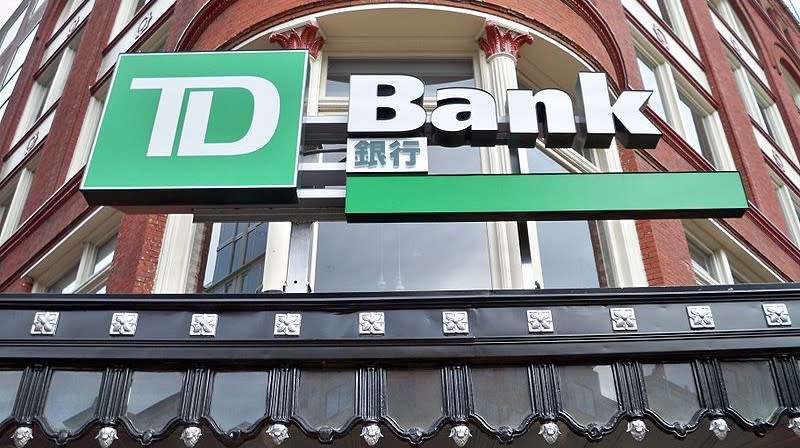Toronto-Dominion Bank: Last Bank Standing

Macquarie Research analyst Jason Bilodeau has a fondness for green ? Toronto-Dominion Bank (TSX:TD)(NYSE:TD) green, that is.
Bilodeau, who covers Canadian lenders for the Australian bank, has downgraded Canadian Imperial Bank of Commerce (TSX:CM)(NYSE:CM), Genworth MI Canada Inc., and Home Capital Group Inc. on concerns these particular lenders are overexposed to the Canadian housing market ? a market that?s due for a correction.
?Most relevant metrics are currently at unprecedented levels. [Household] leverage is at all-time highs. Home prices relative to income are 2.5 [standard] deviations above their historical average,? Bilodeau wrote in a note to clients. ?Many key metrics are at or above levels seen in the U.S. prior to its most recent housing crisis and are growing worse.?
This cautionary tale is obviously not new. Eventually, like a stopped clock being right twice a day, analysts are going to be correct about a housing correction. It?s a self-fulfilling prophecy.
The question I have for Bilodeau is, Why does he feel TD is worthy of an ?Outperform? rating? I get that it has a wonderful retail banking business in the U.S., but is TD not holding mortgages like the rest of the Big Five Canadian banks? Of course it is.
At the end of October, TD had $128 billion in uninsured residential mortgages and home equity lines of credit, which accounted for 50.3% of its real estate secured lending in Canada; the remaining $126.3 billion is insured.
CIBC had $103.7 billion in uninsured residential mortgages and home equity lines of credit, which accounted for 51.6% of its real estate secured lending in Canada; the remaining $97.4 billion is insured.
So, the fact that CIBC has $24.4 billion, or 19.1% less, in uninsured mortgages outstanding than TD apparently counts for nothing. Add to this the fact TD?s got $40.4 billion in outstanding uninsured mortgages and home equity lines of credit outside Canada compared to $2.5 billion for CIBC, and I?m left wondering why TD?s getting a favoured status among the big banks.
TD owns 41% of TD Ameritrade Holding Corp., which bought Scottrade Financial Services in October for US$4 billion, and then turned around and sold TD Scottrade Bank for US$1.3 billion, making its U.S. retail banking business that much bigger.
In 2016, TD?s U.S. retail business generated $3 billion in net income, or 30% of the bank?s $9.9 billion overall. More importantly, and probably the biggest part of the analyst?s argument, is that its U.S. retail banking segment saw net income increase by 16.2% year over year on an adjusted basis. By comparison, its Canadian retail banking segment saw an increase in its net income of less than 1%.
As a TD shareholder, you?d better hope the U.S. doesn?t falter under Trump because almost 61% of the bank?s earnings are currently in a stall.
Over at CIBC, its retail and business banking segment, which services Canada only, generated $2.7 billion in net income in 2016 ? a 6.3% increase from a year earlier. Add to that a wealth management business, which grew income by 67% in 2016 to $864 million. With or without PrivateBancorp, CIBC?s business isn?t exactly going to pot.
Look; of the Big Five Canadian banks, CIBC has the highest dividend yield (4.5%) and the highest earnings yield (9.6%), and yet Bilodeau feels CIBC?s valuation is the one most at risk.
I get lowering both Genworth and Home Capital, whose businesses are facing difficulties related to housing. And I think I can even stomach the rationale for lowering CIBC based on its level of uninsured mortgages as a percentage of its regulatory capital. However, I just don?t get keeping TD at ?Outperform.?
Should it be the last bank standing? No, I don?t believe it should.
11 Lessons We Learned from Billionaire Investor
In this shocking 200 page investigative report, our staff outlines the lessons we learned during an exclusive meeting with legendary investor, Warren Buffett. From hitting stock-market homeruns to avoiding going broke, we'll outline in great detail all you need to know to become a great investor.
More reading
Dividend Investors: Should You Own Enbridge Inc. or Toronto-Dominion Bank?
Canadian Imperial Bank of Commerce: The Bank Stock to Own in 2017
RRSP Investors: 2 Dividend-Growth Stocks to Hold for 20 Years
Fool contributor Will Ashworth has no position in any stocks mentioned.
11 Lessons We Learned from Billionaire Investor
In this shocking 200 page investigative report, our staff outlines the lessons we learned during an exclusive meeting with legendary investor, Warren Buffett. From hitting stock-market homeruns to avoiding going broke, we'll outline in great detail all you need to know to become a great investor.
Fool contributor Will Ashworth has no position in any stocks mentioned.

 Yahoo Finance
Yahoo Finance 